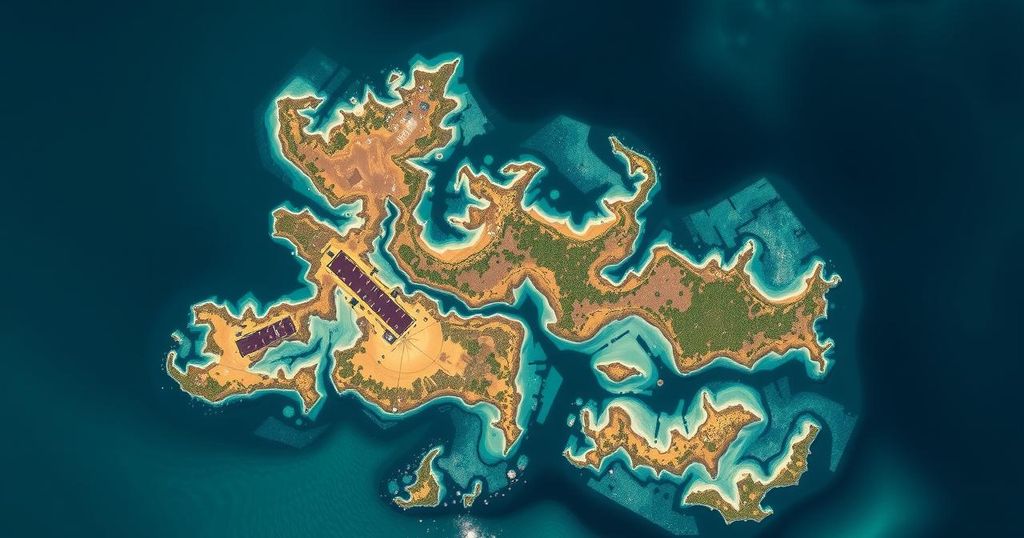Devastation in Agalega and Mayotte Caused by Tropical Cyclone Chido
Tropical Cyclone Chido struck Agalega on December 11, 2024, as a Category 4 cyclone, causing widespread damage and displacing residents. The storm’s strong winds and surges devastated infrastructure, prompting swift relief efforts from Mauritius and India. The cyclone continued to Mayotte, resulting in further destruction and a humanitarian crisis, exacerbated by water and supply shortages.
On December 11, 2024, Tropical Cyclone Chido struck the Agalega Islands in the Indian Ocean, registering as a Category 4 equivalent cyclone. With maximum sustained winds reaching 222 km/h (138 mph), this was the most severe cyclone experienced on the islands since 1983, affecting a population of approximately 330 residents. The cyclone caused significant damage to infrastructure, including homes and schools, leading numerous residents from North Island to seek shelter at the local airport. The storm’s impact included high wind gusts and a storm surge that peaked at 8 meters (26 feet), which resulted in widespread destruction and disruption of communication lines.
Following landfall, efforts to provide assistance were swiftly organized. Mauritian Minister Shakeel Mohamed confirmed that a Dornier aircraft from the Mauritian Coast Guard was dispatched for aid, with an Indian cargo plane also joining the relief operations. The cyclone continued its path, moving north of Madagascar before making landfall on the island of Mayotte on December 14, where the impact was devastating. With destructive winds reaching 220 km/h (136 mph) and torrential rains, Mayotte suffered extensive damage to its infrastructure, including hospitals and its airport.
Reports indicated that approximately one-third of Mayotte’s population of 320,000 individuals had become homeless due to the storm. Compounding the crisis, severe shortages of potable water and medical supplies hampered ongoing rescue and recovery efforts. Emergency response teams were deployed; however, their access was limited due to blocked roadways and excessive floodwaters. On December 16, officials from Mayotte voiced grave concerns regarding the potential escalation of the death toll, with fears that hundreds, if not thousands, remained unaccounted for. The full scope of the disaster is still being assessed.
Tropical Cyclone Chido represents a significant meteorological event, characterizing the intensifying impact of climate-related weather phenomena. The cyclone’s landfall on Agalega, a relatively remote and small island population, underscores vulnerabilities many such locations face against extreme weather incidents. Cyclones, particularly those sustaining high wind speeds and storm surges, pose considerable risks of infrastructure damage, as seen in both Agalega and Mayotte. Understanding these impacts not only informs public safety responses but also highlights the need for effective disaster preparedness and recovery strategies in vulnerable regions. Cyclones have historically been a threat in the Indian Ocean, making this incident part of a broader pattern in climate-related events affecting island nations and coastal infrastructures.
In summary, Tropical Cyclone Chido has severely impacted the Agalega Islands and Mayotte, resulting in significant infrastructural damage, displacing many residents, and raising serious humanitarian concerns. The continuation of rescue operations in the aftermath of the cyclone highlights the urgency of addressing both immediate needs and long-term recovery strategies for affected populations. The situation remains critical, with officials striving to assess the full extent of the devastation and coordinate further assistance as recovery efforts progress. The cyclone encapsulates the ever-pressing challenges posed by extreme weather events, emphasizing the criticality of preparedness and responsive infrastructure in safeguarding vulnerable communities.
Original Source: watchers.news




Post Comment